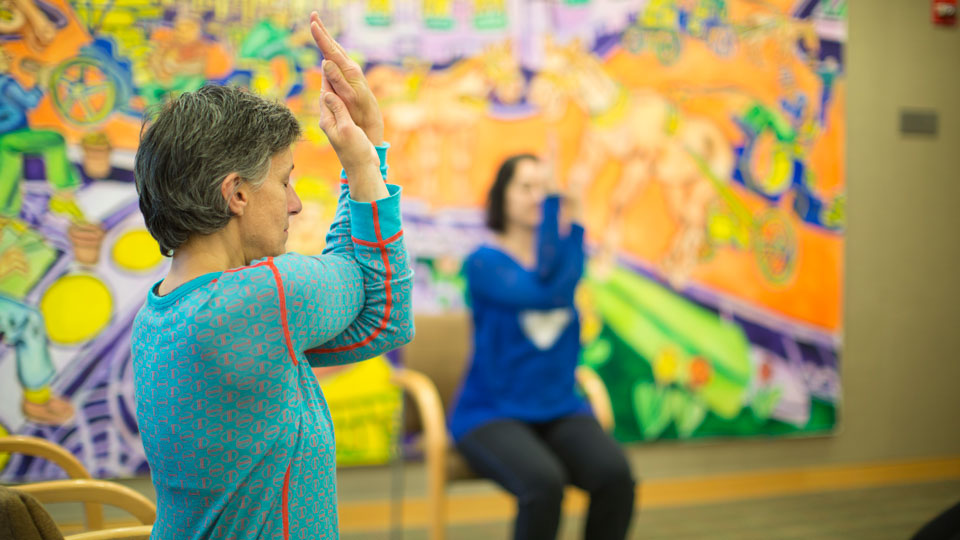Support for Breast Cancer
At NYU Langone’s Perlmutter Cancer Center, our doctors play an active role in your ongoing care. You can discuss a schedule for follow-up visits with your doctor after your treatment ends.
You may schedule mammograms and other imaging tests every 6 to 12 months after treatment. The doctor may recommend a monthly breast self-exam to help quickly detect a recurrence.
Your doctors can create a personalized plan to help you recover from surgery, chemotherapy, and other treatments.
Integrative therapies, including massage therapy and acupuncture, can often help women with breast cancer feel better during and after treatment. Massage therapy can help reduce pain, decrease stress, and improve mood. Acupuncture may relieve treatment-related fatigue, nausea, vomiting, hot flashes, and pain.

Yoga classes tailored to the needs of people with breast cancer are also available at Perlmutter Cancer Center, and can help reduce stress and fatigue.
Neuropathy Treatment
Neuropathy, or nerve damage, is a common side effect of some chemotherapy drugs used to treat breast cancer. It may lead to numbness, tingling, pain, and weakness in the hands, feet, arms, legs, or in other parts of the body.
Doctors at NYU Langone’s Rusk Rehabilitation can prescribe medication to help ease the discomfort caused by neuropathy. They also offer physical therapy to prevent the condition from interfering with your balance and strength.
Acupuncture or massage therapy may offer some relief from neuropathy symptoms. These and other integrative health services are available at Perlmutter Cancer Center.
Lymphedema Care
Surgery for breast cancer often includes the removal of lymph nodes, which may damage lymph vessels in the breast and underarm. Damage to these vessels can cause lymph fluid to build up, which can lead to swelling and arm discomfort—a condition known as lymphedema.
Doctors and physical therapists at Rusk Rehabilitation can show you how to prevent lymphedema after surgery—for example, by wearing wraps around your arms to compress them. Doctors also show you how to identify early warning signs of the condition, such as aching, tingling, or a feeling of fullness in the underarms, arms, or hands. The sooner management starts, the more likely the condition can be minimized.
Our oncologists and physical therapists can show you how to prevent lymphedema after breast cancer surgery.
After therapy for lymphedema is complete, specialized massage therapists at Perlmutter Cancer Center are available to help with manual lymph fluid drainage.
Nutrition and Exercise
Nutritionists and integrative care specialists at Perlmutter Cancer Center can help you improve your overall health through customized diet and exercise plans.
After consultation with doctors at Rusk Rehabilitation, physical therapists can provide a program of strength and aerobic exercise to address any weakness and fatigue caused by breast cancer or its treatments, such as chemotherapy and radiation therapy.
An exercise program can also help improve balance, flexibility, and mobility, which may be affected by cancer surgery. It can help you to keep moving throughout treatment and recovery.
Psychological Support
Psychological support can help you cope with any concerns or anxiety that may arise during and after treatment. Our experts provide individual counseling sessions and support groups for people with breast cancer. Group meetings are also available for women with BRCA1 or BRCA2 mutations.
Support Groups and Counseling
We offer support groups and individual counseling to provide ongoing support during breast cancer treatments.
Learn MoreFor individual counseling and support, call 212-731-5110 or 212-731-6056. To reach a breast cancer social worker at Perlmutter Cancer Center at NYU Langone Hospital—Long Island, call 516-663-2556.
Genetic Counseling Services
We offer a genetic counseling program to help women who are concerned about a family or personal history of breast cancer.
Our experts offer genetic counseling and testing to people who may carry the BRCA1 or BRCA2 mutations and may be at increased risk for cancer. Services are also available to other family members who may be at risk.
Support for Young Adults
NYU Langone’s Perlmutter Cancer Center assists young adults who are navigating cancer-related services through our Early Onset Cancer Program. People 45 and younger with a breast cancer diagnosis may contact our program for help connecting with clinical care and accessing support services.
Fertility Services
Some breast cancer treatments can affect fertility. Our oncologists work with reproductive medicine specialists at NYU Langone’s Fertility Center and NYU Langone Reproductive Specialists of New York to provide options such as freezing unfertilized eggs or fertilized embryos before cancer treatment begins.
These procedures require that women delay cancer treatment for a few weeks while they take fertility drugs to stimulate egg production. Our gynecologic oncologists and fertility experts collaborate to ensure that any delay in treatment is safe for you.
Meet Our Doctors
Perlmutter Cancer Center specialists provide care and support during treatment.
Browse Doctors